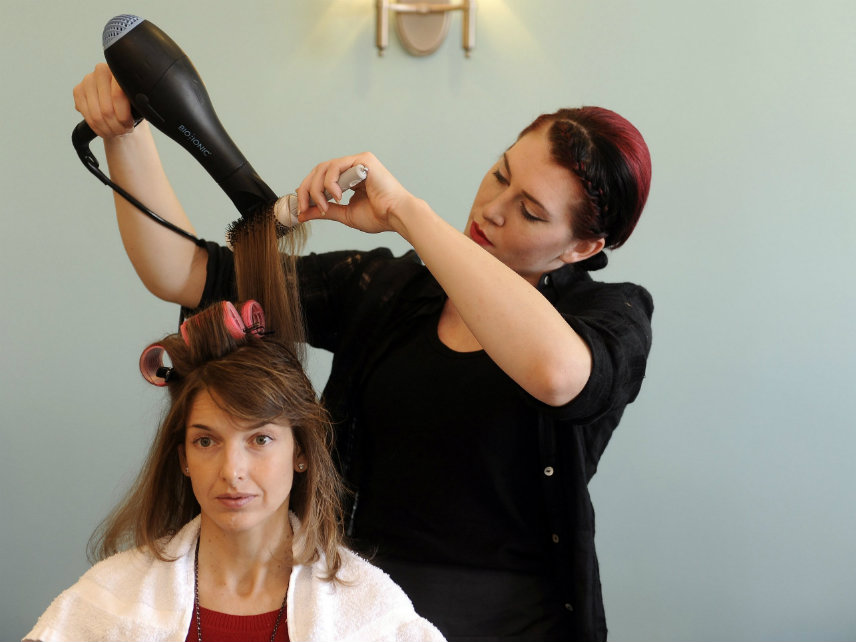Why Does Blow-Drying Hair in Arizona Require 1,000 Hours of Training?
State lawmaker says that makes no sense, plans to introduce bill repealing requirement.

Using a blow-dryer is not particularly difficult or dangerous. Millions of Americans dry their own hair every morning without widespread reports of singed scalps or accidental electrocutions. Children use them without incident.
But picking up a hair dryer in the state of Arizona and using it to dry someone else's hair, for money, requires more than 1,000 hours of training and an expensive state-issued license. Blow-drying hair without a license could—incredibly—land you in jail for up to six months.
America is saturated with ridiculous licensing rules that do little to protect public health or safety. They exist mostly as a way to drive-up prices and restrict employment. Cosmetology licensing laws are some of the worst offenders of common sense, and Arizona's cosmetology licensing laws truly boggle the mind. Doing something as simple as shampooing, drying, and styling hair requires a full-fledged cosmetology license, which includes years of training in hair and skin care, makeup application, and other un-related skills.
Before applying for that license, an applicant would have to graduate from a beauty school, which can cost as much as $15,000 in tuition.
State Rep. Michelle Ugenti-Rita (R-Scottsdale) says the licensing requirement is particularly troublesome for so-called blow-dry bars—salons that offer nothing more than shampooing and styling of hair, without cutting, coloring, or other more advanced hair care.
She plans to introduce a bill to exempt workers who "dry, style, arrange, curl, hot-iron, or shampoo and condition hair" from the state's cosmetology licensing law, as long as they do not use chemicals to permanently straighten or curl hair and do not cut hair either.
"When they told me about the scope of their business, you could clearly see that it was an impediment to them hiring, and for someone to be hired, simply to hire them for blowing out hair," Ugenti-Rita told the East Valley Tribune this week.
That makes a lot of sense, so naturally cosmetology schools are opposed to it.
"Students go to school to get a cosmetology license," Cathy Koluch, a member of the American Association of Cosmetology Schools and the owner of a salon in Chandler, Ariz., told the East Valley Tribune. "They are learning more than just styling hair, cutting, coloring; they're learning the health and anatomy side of it."
That's exactly the problem. There's no reason to require all those classes if a prospective salon worker wants to do nothing more than dry and style hair—something he or she would be free to do, legally, for free, at home. Charging for those skills and practicing them in a salon should not trigger onerous training and licensing requirements.
Of course a story about cosmetology licensing would not be complete without hyperbolic statements of the potential harms that could befall customers serviced by unlicensed workers.
"People come into your salon with illnesses," Koluch says. "They could have an open wound, they could have lice. How are these people going to be trained to handle these situations?"
Anyone with an open wound on their head should probably seek professional care from someone with a different sort of license—the kind that you get after attending medical, rather than beauty, school. An unlicensed professional working in a dry bar is probably going to do the same thing that a licensed cosmetologist with 1,000 hours of training would do: tell you to go to a hospital and have your injury treated.
This sort of hyperbole is par for the course in Arizona. Unlicensed barbers are "a real risk," Donna Aune, executive director of the Arizona State Board of Cosmetology, told a local television station in Tucson earlier this year when defending the board's decision to investigate a student who gave free haircuts to homeless people.
Aune also shows up several times in a 2009 investigation by Tuscon.com about the "dangers" of receiving a manicure or pedicure from an unlicensed professional. And she pops up in this absurd story about a terrible eyebrow waxing accident—in a fully licensed salon, by the way—trying to pin the blame on unlicensed cosmetologists and calling for more state agents to conduct inspections.
When she's not fear-mongering about the consequences of a bad haircut or investigating acts of goodwill, Aune is ringing up huge travel bills and dining out at the taxpayers' expense, as the state comptroller reported in a September audit.
Cosmetology boards and lobbyists for beauty schools can justify absurd licensing laws any way they want, but they are, at last, on the defensive. Gov. Greg Ducey has indicated support for licensing reform in Arizona and Ugenti-Rita's bill would make it easier for entrepreneurs to work in the state by undoing a pointless, punitive licensing measure.
"Requiring blow dry bar stylists to get cosmetology licenses does not protect the public health and safety—after all, people shampoo, blow dry, and style hair in their homes all the time, without any special training," say Christina Sandefur and Jenna Bentley, of the Arizona-based Goldwater Institute, a free market think tank that supports the bill.
"Arizona's stifling regulations leave blow dry stylists without work," they wrote in an op-ed this week. "and customers with fewer options at higher prices."


Show Comments (19)